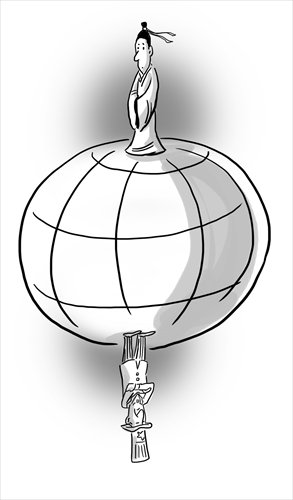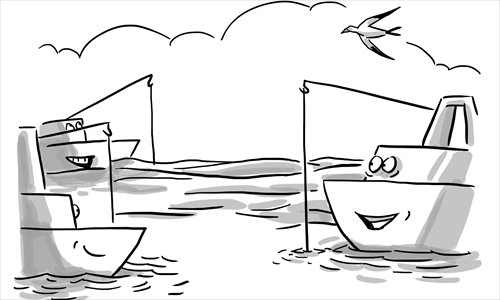Dai Bingguo: China not to be intimidated, even if US sends 10 aircraft carriers to South China Sea
The Chinese people would not be intimidated by the US actions, not even if the US sends all its ten aircraft carriers to the South China Sea, said Dai Bingguo, former state councilor of China, on Tuesday at the dialogue on South China Sea between Chinese and US think tanks in Washington, DC.
Malacca Strait harbor project illuminates eruption of S.China Sea hostility is unlikely
Malaysia and China are reportedly looking to jointly build a harbor in the Strait of Malacca, according to media reports. The news came at a very sensitive time, as heightened tensions among China and some Southeast Asian countries over territorial claims in the South China Sea have attracted the attention of the world.
US, China can adapt to each other
It will be the largest challenge for China and the US to avoid the Thucydides Trap.
South China Sea arbitration abuses international law, threatens world order: People’s Daily
“The unilateral filing of the South China Sea arbitration case by the Aquino administration of the Philippines and the arbitral tribunal’s overreach and abuse of power is a desecration of the spirit of the rule of law and pose a threat to current international order," read an editorial published by the People’s Daily on Tuesday.
People’s Daily slams US for flexing military muscle in waters near Philippines
Playing a rather destructive role in the South China Sea issue, the US is actually the root cause of escalating tension in the region with its threats to China’s territory and maritime rights, the People’s Daily strongly rebuked the US in a commentary published on Wednesday.
Arbitral tribunal may cost Duterte’s chance of mending Beijing ties
Duterte faces the opportunity of a lifetime to rise to the occasion and assume the difficult but eventually rewarding task of leadership. And the time is running out.
US publicity campaign against China on South China Sea ill-intentioned
The South China Sea proves to be a tranquil sea with inherent freedom of navigation, but some countries, with ulterior motives, have launched publicity campaigns to deliberately play up the South China Sea issue in support of their hegemonist military moves.
Criticisms of Philippines arbitral tribunal not limited to Chinese scholars
Will the Arbitration, at the end of the day, contribute to the peace and stability of the South China Sea or only create new sources of contentions and conflicts? These are questions faced by the Arbitrator when balancing values between public conscience and self-interest, between law and politics, and between justice and peace.
The South China Sea Dispute: Beijing’s View
China is exercising its legitimate rights by upholding the sovereignty of our islands in the South China Sea.
China’s sovereignty over the Nansha Islands and Xisha Islands was restored after World War II, in accordance with the Cairo Declaration and the Potsdam Proclamation. But in the 1970s, certain countries started to illegally occupy some islands and reefs of the Nansha Islands.
How to bridge the divide over the South China Sea
The differences between China and the US over the South China Sea issue have become a matter of concern and even anxiety. But some of the perceptions in the US and elsewhere about China's policy and intentions in the area are misplaced. A pressing task is to understand the facts and China's intentions correctly so as to avoid real danger and consequences as a result of misinterpretation and miscalculation.
Persisting Cold War mentality over S.China Sea chokes Sino-US ties
As the Chinese side has said, there is plenty of room in the Pacific for all. The US side, however, is wedded to obsolete geopolitical concepts and policies which bear directly on the South and East China Seas.
Hypocrisy abounds in Philippines’ plea for South China Sea arbitration
But just because the Philippines is smaller and weaker than China does not necessarily make its claims valid.
US’ frequent military moves only escalate South China Sea tensions
Uncle Sam’s play of political brinkmanship in the South China Sea should come to an end for the sake of peace and stability in the Asia-Pacific region, as well as the hard-won mutual trust with China.
Can US win a new Cold War upon China?
There are barely any conditions for the US to copy in the globalized era what it did in the Cold War.
Global opinion on China side over sea spat
The South China Sea issue needs to be addressed by countries in the region, with no space for the US to weigh in.
Joint development still key for S.China Sea
Striking back is not the only solution to the arbitration raised by the Philippines. Seeking wider cooperation with other claimants and neighboring countries can also help dispel the negative impact of the ruling of the arbitration.
Chinese officials, experts defend stance on Philippines' arbitration
The South China Sea arbitration initiated by the Philippines is attracting much attention as the final ruling will be announced before the end of June.
Arbitral award offers chance for China to explain stance
As a responsible power, China can play a more active role in writing the international rules. Instead of copying the experiences of developed nations, Chinese scholars can put forward more constructive ideas to make international laws with more Chinese characteristics.


